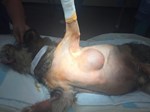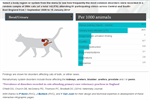Search - VetCompass
141 - 150 of 170 results
-
New paper on canine brachycephaly and upper respiratory disease!
A new VetCompass paper published this week in Canine Genetics and Epidemiology (CGE) explores upper respiratory tract disease and brachycephalic associations in dogs: Epidemiological associations between brachycephaly and upper respiratory tract … -
New research explores diagnoses associated with ionised hypercalcaemia in cats and the prevalence of concurrent urolithiasis
A new study from the Royal Veterinary College explores the diagnoses associated with ionised hypercalcaemia in cats and the prevalence of concurrent urolithiasis. High ionised calcium concentrations can occur for numerous reasons. Previous, often … -
Antimicrobial usage in farm animal practices in the UK: A mixed-methods approach
A new study at the Royal Veterinary College reported the frequency and risk factors for using highest priority critically important antibiotics (HP-CIAs) in farm animals in the UK. This study aimed to evaluate the overall usage of antibiotics and … -
New study examines medial canthoplasty surgical management of brachycephalic ocular syndrome in dogs
A recent research study has examined a type of surgical management used to address brachycephalic ocular syndrome (BOS), a condition prevalent in popular flat-faced (brachycephalic) dog breeds. Due to their 'bulging eyes', a medial canthoplasty (MC) … -
Excessive exercise responsible for three-quarters of heatstroke cases in dogs, study shows
The most common cause of potentially-fatal heatstroke in dogs is being exercised by their owners, the largest study of its kind has found. A team at Nottingham Trent University and the Royal Veterinary College found that exertion or exercise – … -
Big data from VetCompass reaffirms value of Pimobendan in management of canine heart disease
A new VetCompass study from the Royal Veterinary College (RVC) has confirmed the findings of previous studies, showing positive outcomes for pimobendan treatment in dogs with heart disease. The results – using a successful application of “target … -
UK dogs and their fatty lumps: finally the risks explained
Springer Spaniels, Dobermann Pinscher, Weimaraners and Labrador Retrievers: some of our most popular dog breeds in the UK are also the most susceptible to lipomas (also known as fatty masses or fatty lumps), according to the Royal Veterinary College … -
Explore VetCompass findings on UK cats!
We have just released new additions to the growing collection of interactive data displays (‘infographics’) available on the VetCompass website! These visual tools provide handy summaries of demographic information & disease prevalence estimates … -
VetCompass at the first international Canine Behaviour & Genetics meeting
The implications of consistently producing or selecting dogs which are not appropriately 'fit for function' both mentally and physically are manifold, with detrimental effects on canine welfare, economic investments and the integrity of the human- … -
Novel VetCompass™ research takes the concept of Man's "Best Friend" to a new level
Man's "Best Friend" just got even better Dogs have long been called Man’s Best Friend, providing both companionship and work to their human owners. But VetCompass™ is now harnessing the power of Big Data Analyses from anonymised veterinary …










